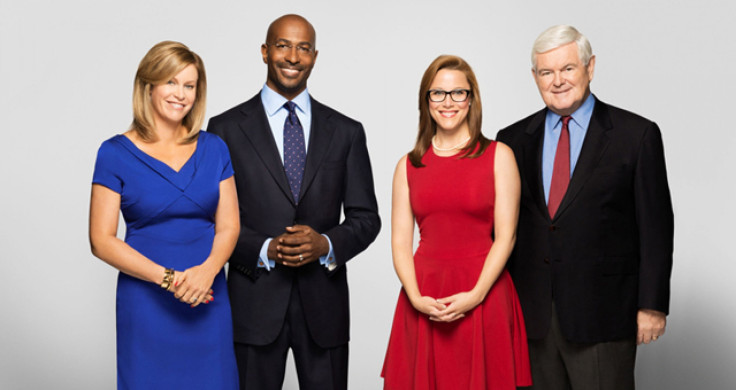CNN Ratings 2013: ‘Crossfire’ And ‘New Day’ Struggles Spell Trouble For Jeff Zucker

To assess the success of CNN’s ongoing reinvention, it helps to know where to look. The problem is, viewers just keep looking away.
“Crossfire,” the network’s much-hyped roundtable reboot, had a difficult go of its debut week. Armed with disparate punditry from the likes of Newt Gingrich, Stephanie Cutter, Van Jones and S. E. Cupp, the program debuted on Monday, Sept. 9, with only 582,000 viewers, according to Nielsen numbers compiled by Mediabistro. While that’s a significant boost compared to the same time slot in previous weeks, it’s still far behind MSNBC’s “Politics Nation” and Fox News’ “Special Report,” which attracted 617,000 and 2.40 million viewers, respectively.
It gets worse. Viewership for “Crossfire” waned as the week progressed. By Friday it had dropped some 47 percent, all while critics derided it for lacking freshness, originality or chemistry. Even fictional news anchor Will McAvoy, of “The Newsroom” fame, took a potshot at it:
Okay, Crossfire, do are Michele Bachmann and Charlie Rangel represent the best people to invite in order to have a serious conversation?
- Will McAvoy (@WillMcAvoyACN) September 19, 2013
All of this follows an equally rough few months for CNN’s new morning show, “New Day,” which features Chris Cuomo, Kate Bolduan and Michaela Pereira. The show debuted in June with sluggish numbers and continues to plod along at a snail’s pace. Even a recent exclusive interview with President Obama wasn’t enough boost viewership, according to Mediabistro. After more than three months on the air, the show, which debuted to much fanfare, is not shaping up to be a viable threat to either of its rivals, “Fox & Friends” and “Morning Joe.” Combine that with “Crossfire’s” soft opening, and you have more trouble for the long-suffering cable news pioneer.
Some of these ratings woes are just circumstantial, of course. The crisis in Syria, which has dominated news cycles since late last month, has not delivered the kind of riveting content that keeps viewers’ eyeballs glued to their televisions. At the same time, it’s getting more and more difficult to not see CNN’s struggles as a referendum on the performance of Jeff Zucker, who took over as president of CNN Worldwide in January. The former NBCUniversal wunderkind -- who at the age of 26 breathed new life into NBC’s “Today” show -- Zucker is known for his nose for personality-driven news and bold programming choices. He took the reins at CNN at a time when the creaky network was suffering some of the lowest ratings in its history, and his willingness to jump right and start cleaning house raised hopes that he could turn CNN’s viewer exodus around.
And to some extent, he did. Over the summer quarterly ratings showed that CNN moved into second place among cable news networks, ahead of MSNBC -- whose ratings had been in a free fall of sorts -- but still far behind industry leader Fox News. Total primetime viewership was up an extraordinary 50 percent compared with the same period last year, even more for weekday primetime viewership.
In context, however, those numbers are not as impressive for two reasons. First, CNN’s ratings were so low the year before, the viewership hike only means that the network is no longer in the basement. (Case in point: CNN’s press release in late August, which focused largely on ratings gains made against last year’s dismal numbers.) Second, much of CNN’s viewership boost can be attributed to major news events such as the Boston Marathon bombings and the Jodi Arias murder trial.
In other words, people are still turning to CNN for the same reasons they always have: They trust the network more than they do its partisan counterparts during times of crisis. That’s good news for CNN as a brand, but not so much for Zucker’s reconstruction efforts.
CNN is part of the Turner Broadcasting System, a unit of Time Warner Inc. (NYSE:TWX). Got a news tip? Send me an email. Follow me on Twitter: @christopherzara
© Copyright IBTimes 2024. All rights reserved.












